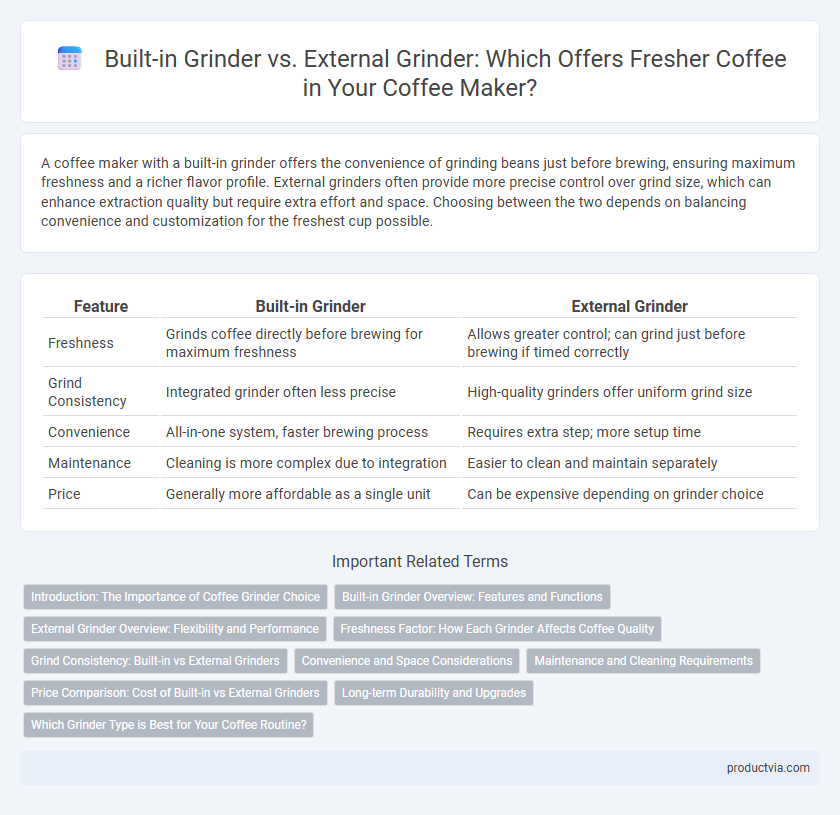A coffee maker with a built-in grinder offers the convenience of grinding beans just before brewing, ensuring maximum freshness and a richer flavor profile. External grinders often provide more precise control over grind size, which can enhance extraction quality but require extra effort and space. Choosing between the two depends on balancing convenience and customization for the freshest cup possible.
Table of Comparison
| Feature | Built-in Grinder | External Grinder |
|---|---|---|
| Freshness | Grinds coffee directly before brewing for maximum freshness | Allows greater control; can grind just before brewing if timed correctly |
| Grind Consistency | Integrated grinder often less precise | High-quality grinders offer uniform grind size |
| Convenience | All-in-one system, faster brewing process | Requires extra step; more setup time |
| Maintenance | Cleaning is more complex due to integration | Easier to clean and maintain separately |
| Price | Generally more affordable as a single unit | Can be expensive depending on grinder choice |
Introduction: The Importance of Coffee Grinder Choice
Choosing between a built-in grinder and an external grinder significantly impacts coffee freshness and flavor extraction. Built-in grinders offer convenience and consistent grind size tailored to the coffee maker's brewing system. External grinders often provide superior grind quality and customizable settings, allowing greater control over coffee texture and aroma preservation.
Built-in Grinder Overview: Features and Functions
Built-in grinders in coffee makers offer integrated burr or blade grinding mechanisms that ensure freshly ground beans for each brew, enhancing aroma and flavor. These grinders come with adjustable grind settings, allowing users to customize the coarseness for various brewing methods such as espresso, drip, or French press. The seamless design reduces countertop clutter and streamlines the brewing process by combining grinding and brewing into one appliance.
External Grinder Overview: Flexibility and Performance
An external grinder offers superior flexibility and performance for coffee enthusiasts seeking ultimate freshness. With adjustable grind settings and higher-quality burrs, external grinders provide more precise control over grind size, enhancing flavor extraction. This versatility supports various brewing methods, ensuring consistently fresh and tailored coffee grounds beyond what built-in grinders typically achieve.
Freshness Factor: How Each Grinder Affects Coffee Quality
Built-in grinders in coffee makers provide convenience and consistent grind size but may generate heat that can slightly diminish coffee freshness by affecting the beans' aromatic oils. External grinders typically offer superior grinding precision and minimal heat generation, preserving the coffee beans' natural flavors and optimal freshness. For the highest quality brew, external grinders are preferred due to their ability to maintain coffee at peak freshness through more controlled grinding processes.
Grind Consistency: Built-in vs External Grinders
Built-in grinders in coffee makers often provide moderate grind consistency suitable for general brewing but may lack the precision needed for specialty coffee. External grinders typically offer superior grind uniformity and customizable settings, enhancing extraction quality and flavor profile. Prioritizing a high-quality external grinder ensures optimal freshness and consistency for a more refined coffee experience.
Convenience and Space Considerations
Built-in grinders offer seamless convenience by integrating grinding directly into the coffee maker, reducing countertop clutter and simplifying the brewing process. External grinders provide greater control over grind size and consistency, but require additional space and an extra step in preparation. Choosing between the two depends on balancing countertop space limitations with the desired level of grinding precision and ease of use.
Maintenance and Cleaning Requirements
Built-in grinders in coffee makers require regular cleaning to prevent coffee oil buildup and residue that can affect flavor and performance, often needing specialized tools or brushes. External grinders offer easier maintenance and thorough cleaning options since they can be disassembled, reducing the risk of buildup impacting the coffee maker itself. Consistent cleaning of either grinder type is essential to preserve freshness and extend the appliance's lifespan.
Price Comparison: Cost of Built-in vs External Grinders
Built-in grinders typically increase the initial cost of a coffee maker, ranging from $200 to $600 more compared to models without grinders. External grinders vary widely in price, offering options from budget-friendly $40 manual grinders to premium $500+ electric grinders, allowing greater flexibility in investment. Choosing an external grinder often provides better value for fresh coffee grounds without committing to the higher upfront cost of a built-in grinder system.
Long-term Durability and Upgrades
Built-in grinders in coffee makers offer convenience but tend to wear out faster due to frequent use, potentially reducing long-term durability compared to external grinders. External grinders provide superior longevity and allow for easier upgrades to newer burr types or grind settings, maintaining optimal coffee freshness over time. Investing in a high-quality external grinder ensures consistent grind quality and adaptability, crucial for coffee enthusiasts aiming for the best flavor extraction long-term.
Which Grinder Type is Best for Your Coffee Routine?
Built-in grinders offer convenience and consistent grind settings, ideal for those who prioritize ease and speed in their coffee routine. External grinders often provide superior grind quality and customization, preferred by coffee enthusiasts seeking precise control for optimal freshness. Choosing between the two depends on your routine's focus on convenience versus grind precision and freshness enhancement.
Built-in Grinder vs External Grinder for Freshness Infographic

 productvia.com
productvia.com